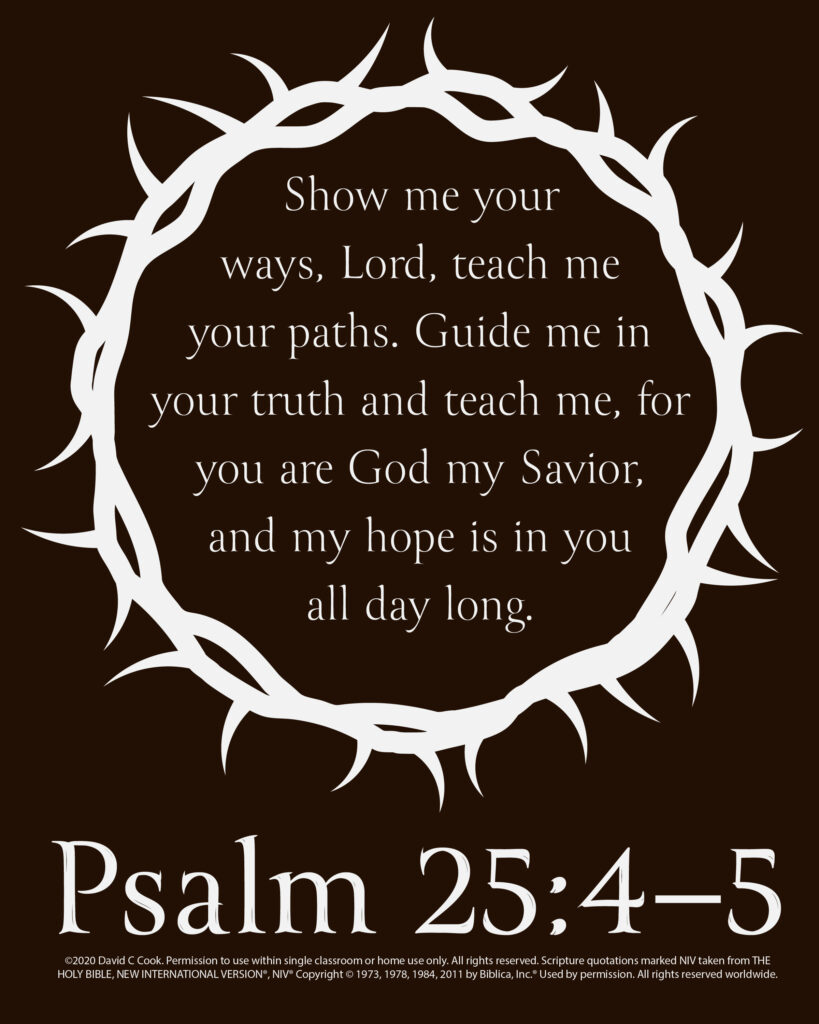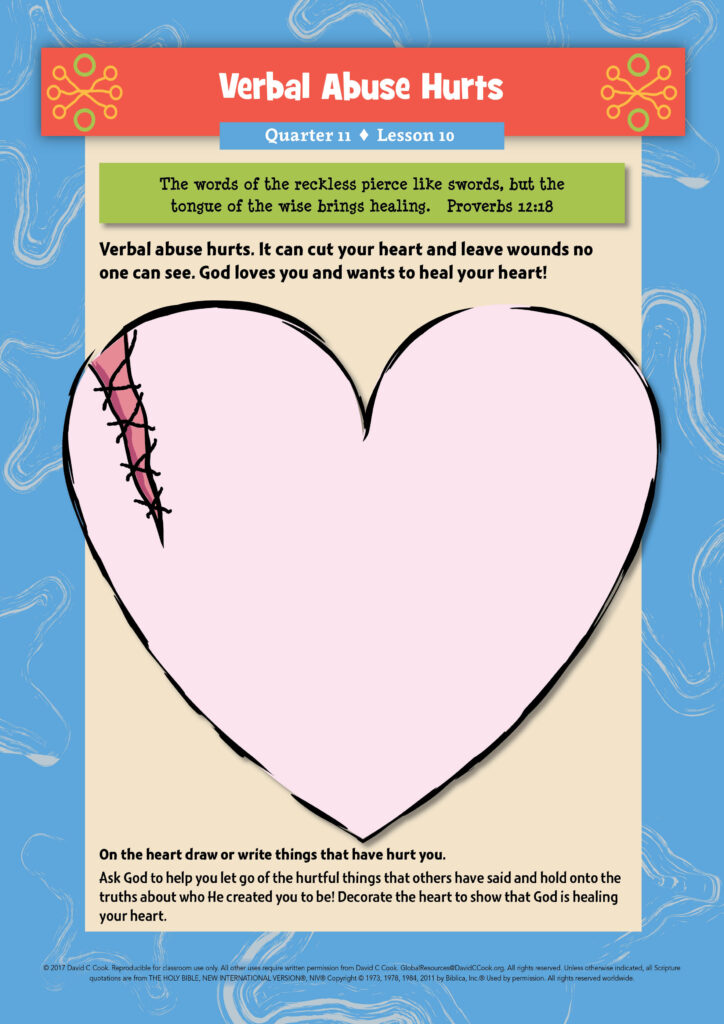During the lesson, the information for you to know is written in regular type, and what we suggest speaking or reading aloud to children is in bold. All resources for this lesson, including the Teacher Guide, Student Page, Family Connection Card, and other resources can be downloaded in a ZIP file by clicking on the following link:
In some lessons you will find "resource articles." These are articles written by experts from around the world to help equip you for your work with children and adolescents. Share them with parents or guardians if you consider it appropriate.
The words of the reckless pierce like swords, but the tongue of the wise brings healing.
Proverbs 12:18
The tongue is powerful. One abusive word can leave a mark on a person’s heart that lasts a lifetime. While the bruises are not visible, verbal abuse can hurt as much as, or more than, physical abuse.
As you prepare to teach this important lesson about verbal abuse, take time to do the Responding activity yourself. If you have paper and pencil, draw a heart, or use a leaf instead. Think about damaging words others have spoken to you throughout your life: name-calling, put-downs, negative comparisons, words expressing hatred or worthlessness. For each damaging word, make a mark on the heart or tear it.
Jesus knows how it feels to be verbally abused. He was mocked and hated. But His love is greater than the hurtfulness of others. Ask Him to heal your wounds. If you struggle to forgive those who have hurt you with their words, ask God to help you let go of bitterness and to replace the wounds on your heart with His expressions of love.
Let your children’s families know that this week the children will learn about the hurt caused by verbal abuse. Many families may not even realize their homes are filled with verbal abuse. If possible, provide the families of your students with copies of the Resource Article “Verbal Abuse.” You can find this Resource Article just before this lesson.
Teacher Tip: If possible, email or text the Family Connection Card to the families of your students.
Welcome the children as they arrive. Ask them if they spoke encouraging words to anyone this week. Give children a chance to share briefly.
Divide the class into groups of 5 and have each group sit in a circle. Give each child 1 leaf. Ask the children to look closely at their leaves and memorize what they look like.
Tell the children to pass their leaves to the right. Tell the children to damage the leaves by making small tears in them or by folding them. They should not destroy the leaves, just damage them. Tell the children to pass the leaves to the right. Again, the children will damage the leaves but not destroy them. Repeat the process until the children have their original leaves back.
Last week we learned that our words can encourage or build others up. This week we will learn that our words can also discourage and tear others down.
The words you say can help or hurt others. Last week we learned about encouraging words. Encouraging words lift up a person and fill him with confidence. But not all words are encouraging. Some are hurtful and damaging.
Listen to what the Bible says about our words:
The words of the reckless pierce like swords, but the tongue of the wise brings healing.
Proverbs 12:18
Stand up and pretend that you are holding a long, sharp sword. Now stab the air with it a few times. Imagine how it would feel to be stabbed by a sword. The Bible says that abusive words hurt like being stabbed with a sword.
When someone says something unkind or thoughtless to us, it hurts. We may feel the pain for a long time. But when a person uses words to hurt us over and over again, that is verbal abuse. Just as physical and sexual abuse cause deep pain and hurt, verbal abuse also creates wounds and scars on the heart that are difficult to heal.
What do you think verbal abuse is?
Allow the children to offer their ideas. They may mention things such as name-calling, swearing at someone, and insulting them.
Verbal abuse is very common. It is possible that you or someone you know has been verbally abused. You may not realize you are being verbally abused, especially if it is your normal experience in life. You may think it is normal for family members to talk to each other in hurtful and unkind ways. But when a person often uses words that are meant to cause pain, it is verbal abuse.
Verbal abuse includes things such as:
Ask your children if they can think of other examples of verbal abuse.
How might verbal abuse hurt someone?
Remind the children that Proverbs 12:18 says that abusive words are like swords.
The wounds caused by verbal abuse are mostly to a person’s heart. The hurt is hidden inside. But there are signs you can see that tell you if someone has been verbally abused.
Someone who has been verbally abused may have many negative emotions at the same time and experience them more often than other people. These include anger, fear, sadness, guilt, shame, self-blame, and worry.
If you are being verbally abused or bullied, or if you know someone who is, talk to an adult
you trust.
If you are being verbally abused, you cannot do anything to change the other person who is abusing you. But you can do some things to protect yourself.
First, know that it is not your fault. People who verbally abuse others often blame the person who is being abused or tell that person that she deserves to be abused. But if someone verbally abuses you, it is never your fault.
Second, try to stay calm and respond wisely. Verbal abusers are often expressing anger, so responding in anger only makes the situation worse. Try to keep your feelings under control and respond calmly and respectfully.
Third, try not to let the abuser know how much she has hurt you. People who feel bad about themselves often try to make others feel bad. The person who is verbally abusing you may be trying to cause you pain because it makes her feel more powerful. If you do not let her know that her words have hurt you, she will not have the same feelings of power.
Finally, do not do or say anything that could put you in danger. Telling a verbal abuser to stop or yelling at him usually does not stop the abuse. These kinds of responses usually make the person more angry and may cause him to try to hurt you in other ways. If possible, try to calmly leave the situation.
Verbal abuse causes deep pain. You may begin to believe the unkind and hurtful things other say to you. But the abusive words of others do not change who you are. No matter what others say, you are a special and valuable person. I care about you, and your friends in this class care about you.
God cares about you too! He created you, and He loves you completely! Listen to this verse. It tells you what God says about you.
For the Lord your God is living among you. He is a mighty savior. He will take delight in you with gladness. With his love, he will calm all your fears. He will rejoice over you with joyful songs.
Zephaniah 3:17, NLT
How does this verse tell us that God talks to us?
The children may answer that He delights in us, loves us, and rejoices over us with joyful songs.
God delights in you! He sings joyfully about how much He loves you! And His words are always truthful and always good! So even if others use their angry words to hurt you, God is telling you with His joyful songs that He loves you very much! He can help you to heal from the pain others have caused. And He can help you to forgive those who have hurt you.
Have the children get back into their groups from the beginning of class. Tell them to hold their leaves.
Look at your leaf. It is not as beautiful as it was when you first received it. It has been damaged. This is like your heart. It has been damaged by the hurtful words people have said to you.
Have each child exchange leaves with someone else.
The leaf that you are holding represents the hurts of the person who gave it to you. Each of those marks represents some pain that words have caused him. Now turn to that person and say something kind and thoughtful to him.
Try to let the kind and encouraging words you have just heard replace the unkind and hurtful words in your heart. When you hear something hurtful, remember these kind words and say them over and over in your mind. And always remember the loving words God says to you and about you. He loves you! And He can help you to heal!
If you are using the Memory Verse Poster, show it to the students.
Show me your ways, Lord, teach me your paths. Guide me in your truth and teach me, for you are God my Savior, and my hope is in you all day long.
Psalm 25:4–5

Optional: If you are using Student Pages, the children can draw things that have hurt their hearts
on them.

Close class by speaking this blessing from Proverbs 12:18 over the children.
Blessing: Jesus loves you very much. When others cut you with their words like a sword, Jesus knows. May God heal your wounds. May He give you words that bring healing to yourself and others.
Lead the children in singing this quarter’s song, if possible.
Life on Life ©2020 David C Cook. Reproducible for home or classroom use only. All other uses require written permission from David C Cook [email protected]. All rights reserved.